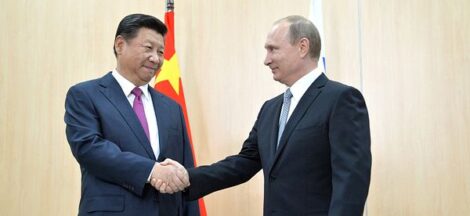By Eoghan Gilmartin
MADRID: Spain’s left-wing Sumar held its second national conference on March 29–30, with its future already in doubt. In two recent polls, the junior partner in the country’s coalition government had lost over half its support since the 2023 general election (down from 12.3 percent to around 6). Even more worryingly, Público calculates that this would mean Sumar keeping only one-third of its seats — making it hard to see how one of Europe’s few broad-left governments could secure reelection.
The speed of Sumar’s unravelling is staggering, with Deputy Prime Minister Yolanda Díaz’s project to reorganize the radical left imploding after its initial solid election result in 2023. This collapse can partially be explained by internal contradictions. Sumar’s capacity to operate as a broad-left unity platform, intended to bring together scattered forces, was undermined from the start by factional warfare between Díaz and Podemos, the previously hegemonic force on the Spanish left.
Much of the political capital Díaz accumulated as a pro-worker labour minister has been squandered over the last two years on a high-stakes standoff with Podemos’s current leadership. In particular, her decision not to offer either Podemos’ Ione Belarra or Irene Montero a ministerial role in the coalition government’s second term gave their party the excuse it had been seeking to break with Sumar, just months after running under its banner in the 2023 election.
After this demoralizing split and a series of heavy losses in regional and European elections, Sumar suffered a body blow last October when a sexual misconduct scandal erupted around its key strategist Íñigo Errejón. His resignation and acknowledgement of abusive behaviour toward female activists saw Sumar struggle to answer questions about what and when it had known about the allegations. As a subsequent allegation of rape emerged (which Errejón denies), the Spanish right went on the attack, decrying the Left’s hypocritical moralizing around feminism. Podemos saw an opportunity to further undermine Díaz’s standing.
Yet the Errejón case was also the first time since the general election that a news story involving Sumar had really captured national attention. As the junior partner in a ruling coalition now without a parliamentary majority, it has struggled to maintain relevance across over eighteen months of institutional deadlock. This is in sharp contrast to the radical left’s experience in Prime Minister Pedro Sánchez’s first coalition government from 2020 to 2023. Operating under the previous Unidas Podemos electoral alliance, it had forced targeted but substantial concessions from Sánchez’s center-left Partido Socialista (PSOE) — ranging from measures tackling the cost-of-living crisis and a strengthening of labour laws to a raft of feminist legislation.
But now faced with a far worse balance of forces in parliament, the four new Sumar ministers Díaz brought into the cabinet have remained marginal figures, whose limited briefs have not provided them with the means to intervene in the political agenda over the last eighteen months. This is particularly devastating since Diaz’s leadership profile is premised on delivering in office — and her reputation for securing progressive policy gains. No longer able to point to its institutional influence, and lacking extra-parliamentary structures of its own or even a strong media presence, Sumar has faded into the background.
This, in turn, points to the narrow basis around which Díaz had sought to reorganize the Spanish left from mid-2022 onward. Drawing on the coalition government’s experience managing the pandemic as well as her legislative achievements strengthening workers’ rights, Sumar looked to broaden the Left’s electoral appeal by presenting itself as a credible party of government — one capable of delivering concrete policy advances. In this respect, its profile chimed with the technocratic spirit of the early 2020s. This was a moment when Bidenomics and the European Union’s COVID-19 rescue fund appeared to open up the possibility of a new progressive state interventionism and when — very briefly — far-right populism was on the retreat.
As Sumar was rolled out across a series of public events in late 2022 and early 2023, Díaz struck a note of pragmatic reformism. Pointing to the coalition’s successful cap on energy prices and her reform cracking down on bogus self-employment in the gig economy, she insisted that through institutional negotiation and social partnership a new social contract for the twenty-first century could be achieved that would go beyond neoliberalism. Missing, however, was any role for grassroots organizing or a clear anti-elite discourse — with Díaz’s more managerial profile and her platform’s softer messaging striking a distinct note to Podemos’s combative left populism.
Podemos founder Pablo Iglesias had in fact also failed to effectively combine his ministerial role with an oppositional discourse during his eighteen months in the cabinet, engaging in highly charged controversies around lawfare and media bias that alienated voters at the height of the pandemic. By contrast, Díaz became the highest-rated political leader in Spain after successfully overseeing the Spanish state’s COVID-19 furlough scheme and pushing through repeated increases in the minimum wage. Quickly becoming a household name on the back of these measures, she was able to appeal to a substantive part of PSOE’s vote despite being a member of the Spanish Communist Party and a Unidas Podemos minister. As Iglesias resigned and named Díaz deputy prime minister in 2021, many on the Spanish left believed her candidacy could see the parliamentary left expand its profile and weight in cabinet.
Reorganizing the Left to exploit this window of opportunity was core to Sumar’s tactical hypothesis. Yet ultimately Díaz and her inner circle were not able to build on this initial promise, failing to expand out from her popularity as a pandemic-era minister to construct a sustainable electoral brand or organization. Like Podemos before it, Sumar was built as a lean, top-down platform, but one which unlike its predecessor did not have its origins in a movement wave beyond the institutions but rather was built from office. This has further reinforced the sense that it is defined more by its promise of “effective” progressive governance than by any clear social or political identity.
Initially, Sumar struck a labourist line, playing up Díaz’s links to trade unionism, before pivoting to a pop-infused green discourse during the 2023 snap election and then slowly moving back toward a certain social and labourist message in recent months, after Errejón’s exit. But these discursive shifts occurred without it ever articulating a broader political project that went beyond its participation in government.
Even in the 2023 general election campaign, the first time Sumar’s machine was put into action, the platform struggled to cut through, with its policy-focused campaign lacking a clear narrative and coming across as overly technical to many voters. Though Díaz had made her name delivering bread-and-butter labour and welfare reforms, her green-aligned campaign advisers changed tack and instead focused Sumar’s campaign on innovative policies linked to free time, equality of opportunity, and mental health. In part, this was a means to distinguish Sumar from Sánchez’s pitch for social democratic stability, but proposals such as its Thomas Piketty–inspired universal inheritance scheme (under which every eighteen-year-old in Spain would receive €20,000 to “kick-start a life project”) failed to engage the Left’s base — with the young academics and professional consultants staffing the campaign unable to sell their policies.
Díaz’s strong performance in the final stretch of the campaign, particularly in the leaders’ debate, was enough to repeat the result obtained by the Unidas Podemos alliance in 2019 but not to win over PSOE voters in the earlier-predicted numbers. Indeed, amid a global reactionary wave, Sánchez bucked the wider trend of incumbents being punished over the cost-of-living crisis, not least because of the Spanish government’s more robust protection of working people’s living standards — which pressure from the Left had been key in securing.
Relief at avoiding a hard-right Partido Popular–Vox government was soon tempered, however, by the weakness of the second coalition’s numbers in parliament — with the administration now depending on the support of the center-right Catalan-nationalist Junts to have a majority to pass legislation. Over the last eighteen months, this pro-independence party has used its effective veto to stall most of the government’s agenda, including blocking the coalition from passing any government budget since the election. At the same time, the limits of the first coalition’s reform agenda have also become apparent, particularly in terms of its toothless housing law — with Spain’s largest cities facing rent hikes of 10–14 percent in 2024.
Ultimately, without the Left’s previous institutional momentum and Díaz’s ability to win high-profile policy concessions in the cabinet, Sumar has not been able to maintain a distinct political profile from PSOE over the last eighteen months. Junts has refused to support Díaz’s star policy proposal for a reduction in the working week from 40 to 37.5 hours while it has also voted down measures such as the renewal of the windfall tax on electricity companies’ profits and a vital reform that would have allowed for rent controls on short-term leases.
Political analyst Mario Rios doubts whether such measures alone could ever have sustained Sumar given the political direction of travel in post-pandemic Europe. “In the current political landscape, governance is necessary, but it is not the main tool for attracting voters and winning elections,” he explains in relation to Sumar’s positioning. “Today’s politics is based on the confrontation of models, values, and worldviews,” he continues. “In contrast, Sumar is based on the idea that voters simply want solutions to the problems they face. Focusing solely on policies like the minimum wage or the reduction of the working week without framing them as part of a broader vision can only lead to electoral defeat.”
Yet Sumar’s failure to flesh out its project and its lack of results in the cabinet cannot alone explain the collapse in Díaz’s popularity among the Left’s own electorate. Over the last eighteen months, she has gone from being the preferred choice for prime minister of two-thirds of Sumar’s 2023 voters to that of just 23 percent. There are now also considerably more Sumar voters from the last election who would prefer Pedro Sánchez to lead the government than her. Though her broader approval ratings are still much stronger than those of Iglesias when he stood down, only 40.9 percent of voters now give her a pass mark or higher, compared to 54.9 percent two years ago.
In this respect, her declining numbers with her own base and the platform’s disastrous European election results last year must also be seen in terms of Sumar’s descent into a spiral of internal crises and scandals. The platform seemed to have hit rock bottom the night of the European elections last June as Díaz resigned as its leader after it had only won 4.6 percent of the vote and three seats. She later clarified she would stay on as deputy prime minister and remain the Left’s figurehead in the government, but she would no longer lead the construction of a left-unity project.
At that point, however, her authority was already shot. The Communist-led Izquierda Unida, which had been Sumar’s most vocal backer only a year earlier, was now denouncing its “hyper leadership” structure and lack of internal democracy after it had been left without a seat in the European Parliament for the first time since its creation in 1986. “The time when Sumar set the agenda and other forces followed is over,” Izquierda Unida coordinator Antonio Maíllo insisted. Then Errejón’s resignation deprived the platform of its only other figure with national name recognition and opened up a firestorm of recriminations on the Left.
More broadly, however, the speed with which Sumar imploded has to be seen in terms of two factors relating to its internal development. First, it was constructed in opposition to Podemos. Second, reorganizing the Spanish left around such a personality-centered platform left it dependent on Díaz’s continued popularity, with Sumar, like Podemos before it, skipping the hard work of on-the-ground organizing during its initial surge, when it still had momentum.
In reality, this is a familiar story on the Spanish left. A series of internally diverse left-wing projects have experienced initial electoral surges over the last decade — from Podemos at a national level and municipalist platforms like Ahora Madrid and Zaragoza en Común to Díaz’s previous En Marea vehicle in Galicia. But operating in an organizational void, most have very quickly come undone under external pressures and internal tensions. Any sustainable future project for Spain’s left will need to transcend this “electoral war machine” model. It seems unlikely that Díaz will be leading it. (IPA Service)
Courtesy: Jacobin




 Tamil Nadu BJP Leader Annamalai Is In The List For New BJP President
Tamil Nadu BJP Leader Annamalai Is In The List For New BJP President 